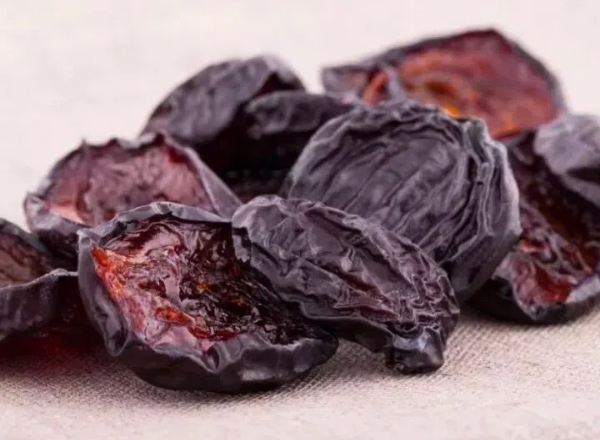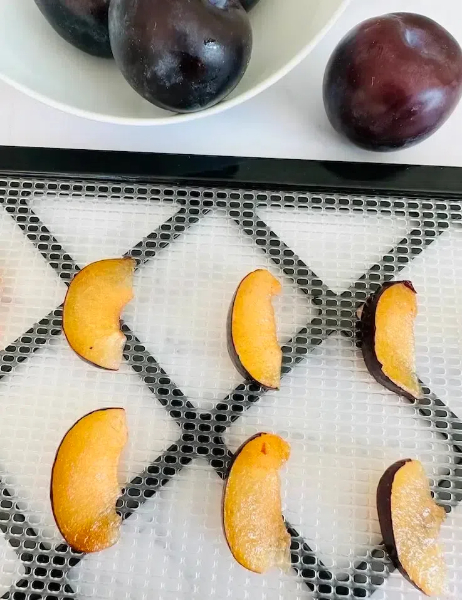
Content Menu
● Understanding Food Dehydration
● Benefits of Using a Food Dehydrator
● Preparing Plums for Dehydration
● Dehydrating Plums
>> Step-by-Step Instructions:
● Tips for Best Results
● Common Uses for Dried Plums
● Nutritional Benefits of Dried Plums
● Troubleshooting Common Issues
● Creative Recipes Using Dried Plums
● Conclusion
● FAQ
>> 1. What type of plums are best for dehydrating?
>> 2. How long does it take to dehydrate plums?
>> 3. Can I dehydrate whole plums?
>> 4. How should I store dried plums?
>> 5. Can I use other fruits in my dehydrator?
● Citations:
Dehydrating plums is a fantastic way to preserve their flavor and nutrition while creating a delicious snack. Using a food dehydrator simplifies the process, allowing you to achieve consistent results. This guide will walk you through the necessary steps, tips, and tricks for dehydrating plums effectively.

Understanding Food Dehydration
Food dehydration is the process of removing moisture from food to inhibit the growth of bacteria, yeasts, and molds. This method not only extends the shelf life of fruits like plums but also concentrates their flavors and nutrients. A food dehydrator is an appliance designed specifically for this purpose, using controlled heat and airflow to dry foods evenly.
Benefits of Using a Food Dehydrator
- Preservation: Extends the shelf life of plums significantly.
- Nutritional Retention: Maintains most of the nutrients found in fresh fruits.
- Convenience: Allows for batch processing without constant supervision.
- Versatility: Can be used for various fruits, vegetables, herbs, and even meats.
Preparing Plums for Dehydration
Before you start dehydrating plums, preparation is key. Here's how to prepare them:
1. Select Quality Plums: Choose ripe but firm plums; Italian or European varieties are ideal due to their lower moisture content.
2. Wash Thoroughly: Rinse the plums under cool water to remove any dirt or pesticides.
3. Remove Stems and Pits:
- Cut each plum in half around the pit.
- Twist gently to separate the halves and remove the pit.
4. Optional Skin Removal: For a smoother texture, you can blanch the plums in boiling water for 30 seconds before peeling them. This step is optional but can enhance texture during drying.
Dehydrating Plums
Now that your plums are prepared, it's time to dehydrate them.
Step-by-Step Instructions:
1. Preheat Your Dehydrator: Set your dehydrator to 135°F (57°C), which is optimal for drying fruits.
2. Arrange Plum Halves on Trays:
- Place the plum halves cut-side down on the dehydrator trays.
- Ensure they are not touching each other to allow proper airflow.
3. Drying Process:
- Start checking after 4 hours; drying times can vary based on humidity and plum size.
- Generally, it may take anywhere from 10 to 18 hours for complete dehydration.
- Rotate trays halfway through for even drying.
4. Check for Doneness:
- The plums should be pliable with no visible moisture in the thickest part.
- Allow them to cool before testing; they will firm up slightly as they cool.
5. Conditioning: Once dried, let your plums sit at room temperature in a loosely sealed container for about a week. This helps equalize moisture content.
6. Storage: Store dried plums in airtight containers or vacuum-sealed bags in a cool, dark place. Properly stored, they can last for months.

Tips for Best Results
- Uniform Sizing: Cut plums into uniform sizes to ensure even drying.
- Avoid Overcrowding: Do not overcrowd trays; air circulation is crucial.
- Monitor Humidity Levels: If you live in a humid area, consider using a dehumidifier or drying outdoors on low-humidity days.
Common Uses for Dried Plums
Dried plums (often referred to as prunes) have numerous culinary applications:
- Snacking: Enjoy them as a healthy snack on their own.
- Baking: Incorporate into muffins, bread, or energy bars.
- Cooking: Use in savory dishes like stews or salads for added sweetness.
- Smoothies: Blend into smoothies for natural sweetness and fiber.
Nutritional Benefits of Dried Plums
Dried plums are not just tasty; they also offer numerous health benefits:
- High Fiber Content: Dried plums are rich in dietary fiber, which aids digestion and helps prevent constipation[6].
- Rich in Antioxidants: They contain antioxidants that combat oxidative stress and may reduce inflammation[8].
- Bone Health Support: Some studies suggest that dried plums may help improve bone density due to their nutrient profile[6].
- Natural Energy Boost: The concentrated sugars in dried plums provide a quick energy boost, making them an excellent snack for athletes or anyone needing a pick-me-up[6].
Troubleshooting Common Issues
When dehydrating plums, you may encounter some common issues:
- Case Hardening: This occurs when the outer layer dries too quickly while moisture remains inside. To avoid this, consider cutting slits in the skin before dehydrating or blanching them briefly beforehand[9].
- Sticking to Trays: If your plum halves stick to the dehydrator trays, consider using parchment paper or lightly greasing the trays with oil before placing the fruit on them[1].
- Uneven Drying: If some pieces dry faster than others, ensure that you rotate your trays regularly during the drying process[4].
Creative Recipes Using Dried Plums
Once you've successfully dehydrated your plums, here are some creative ways to use them:
- Plum Chutney: Combine chopped dried plums with onions, vinegar, sugar, and spices to create a flavorful chutney that pairs well with meats and cheeses.
- Energy Bites: Blend dried plums with nuts and seeds to create energy bites perfect for snacking on-the-go.
- Plum Sauce: Rehydrate dried plums by soaking them in warm water or juice and then blend into a smooth sauce that can be drizzled over pancakes or used as a dessert topping.
Conclusion
Dehydrating plums using a food dehydrator is an efficient way to preserve this delicious fruit while enhancing its flavor profile. With proper preparation and attention during the drying process, you can enjoy homemade dried plums that are both nutritious and versatile in various culinary applications. The benefits extend beyond just snacking; they contribute positively to your overall health while offering endless possibilities in cooking and baking.

FAQ
1. What type of plums are best for dehydrating?
Italian or European plums are recommended due to their lower moisture content and firmer texture.
2. How long does it take to dehydrate plums?
The drying time can vary from 10 to 18 hours depending on plum size and humidity levels.
3. Can I dehydrate whole plums?
While possible, it's best to cut them in half for more efficient drying and better texture.
4. How should I store dried plums?
Store them in airtight containers or vacuum-sealed bags in a cool, dark place for optimal shelf life.
5. Can I use other fruits in my dehydrator?
Yes! A food dehydrator is versatile enough to dry various fruits, vegetables, herbs, and even meats.
Citations:
[1] https://www.beyondthechickencoop.com/how-to-dry-plums/
[2] https://www.motherearthnews.com/real-food/dehydrating-plums-ze0z1502zdeh/
[3] https://terradomilho.eu/2019/03/the-advantages-of-dehydrating-fruit-and-vegetables/
[4] https://anoregoncottage.com/how-to-dry-plums/
[5] https://www.youtube.com/watch?v=c-YOQkKUYzI
[6] https://www.webmd.com/diet/dehydrating-food-good-for-you
[7] https://thehomeintent.com/how-to-make-dried-plums/
[8] https://www.theseasonalhomestead.com/9-benefits-of-dehydrating-food-that-may-surprise-you/
[9] https://www.thepurposefulpantry.com/dehydrate-plums/
[10] https://slowlivingkitchen.com/how-to-dehydrate-plums/











